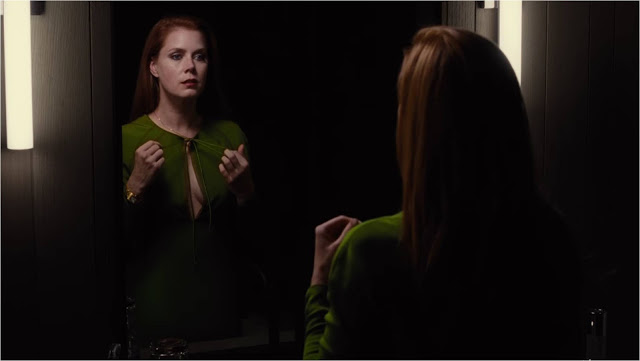Title sequences can do more than just convey rudimentary information about a film’s cast and crew—they can set the mood, introduce a plot, establish a theme. So what to make of the opening credits of Nocturnal Animals, which impassively present a parade of naked, obese women dancing in slow-motion as firecrackers explode around them? Is this garish display meant to be revolting? Titillating? Provocative? Profound? Forced to guess, one might argue that the director, Tom Ford, is attempting to draw a line between happiness and despair, remarking that beauty and brutality are often intertwined. (To do so, one would first need to ignore the accusations of body-shaming that have dogged Ford regarding the sequence.) But that isn’t quite right, because the dirty joke of this dirty movie is that, much like its jarring opening credits, it means absolutely nothing.
Which is not to say that Nocturnal Animals is unsightly. Far from it. A famous fashion designer making his second foray into cinema (following the well-received, overwrought A Single Man), Ford fails to weave the gorgeous with the grotesque as meaningfully as he’d like, but he nevertheless supplies ample quantities of both. For the former, he casts Amy Adams (always a good start), dresses her in ravishing clothes, and plops her in the middle of an austere, pristinely manicured Malibu mansion. Adams plays Susan, a paragon of first-world materialism; she owns an art gallery, attends fancy parties, and is married to a handsome husband (Armie Hammer) who regularly jets off to New York to close deals and screw mistresses. Despite her wealth and creature comforts, Susan is plainly disenchanted with her life—she needs a jolt of excitement to jostle her out of her ennui.
She gets one when the mail brings a package from her first husband, Edward (Jake Gyllenhaal). He’s written a manuscript called Nocturnal Animals, and he’s eager for Susan’s thoughts. As Susan starts to read, the movie slips into the world of Edward’s novel, and the gaudy luxury of Los Angeles is replaced by the clammy swelter of West Texas.
And this is where the grotesque comes into play. The protagonist of this fictitious Nocturnal Animals, as glimpsed through Susan’s mind’s eye, is Tony (Gyllenhaal again), a contended family man with a wife (Isla Fisher) and teenage daughter (Ellie Bamber). They’re on a road trip to nowheresville, driving along one of those ominous, dimly lit Southern highways, when they’re forced off the road by a trio of rowdy locals led by Ray (an unrecognizable Aaron Taylor-Johnson), a swaggering heavy who doesn’t like being patronized. Violence and death ensue, and before long, a despondent Tony is sitting in a police station, being questioned by a no-nonsense detective (Michael Shannon, excellent as always), and thirsting for revenge.
“It’s devastating,” Susan writes to Edward in an email, and in a literal sense, she’s right. The novel’s early scenes feel ripped from a redneck exploitation flick like The Texas Chainsaw Massacre, and as it progresses, it only grows darker and more anguished. Viewed in isolation, the material featuring an increasingly unhinged Tony carries a genuine charge—it is somehow unnervingly exciting, watching this once-happy man sink into a pit of moral decay. And of course, it is always pleasurable to watch Shannon, a naturally sinister presence who here imbues his ethically compromised copper with jaundiced nihilism and delectable menace.
Had Nocturnal Animals remained set entirely within its grimy fictional universe, it might have worked as a taut, reasonably upsetting backwoods thriller. But Ford is after more than that. Adapting a novel by Austin Wright called Tony and Susan, he seeks to link Tony’s terrible predicament to Susan’s own niggling dissatisfaction. In the process, he provides flashbacks to Susan and Edward’s decades-old courtship, when she was a glamorous debutante and he an idealistic young writer. By intercutting these moments of ill-fated romance with Susan’s current depression—all while interspersing passages revealing the fictional Tony’s nightmarish quest for vengeance—Ford explosively illustrates how the questionable choices of our past can forever haunt our present.
At least, that’s the idea. But for all its stylistic craft and narrative ambition, Nocturnal Animals fails to justify its book-within-a-movie conceit. Any connection between Susan and Tony (or, for that matter, Susan and Edward) is wholly hypothetical. Ford’s filmmaking has a surface elegance—the lacquered production design, the impeccably tailored costumes, Abel Korzeniowski’s rippling score—that only underscores its lack of depth. Everything in the film, with the occasional exception of Tony’s Texas terrors, seems carefully manufactured rather than organic. In one of the flashbacks, Susan pointedly questions whether Edward has the talent to succeed as a writer, and ironically, Nocturnal Animals plays less like a refutation of her skepticism than confirmation of it; Ford’s scattered screenplay feels like the work of a determined English-lit student striving to please a particularly stern professor. This, in turn, only makes his obvious stabs at solemnity all the more laughable. For a movie that traffics in such strenuous seriousness and depravity, Nocturnal Animals‘ ultimate tone is one of silliness.
This is disappointing, because it squanders a potentially fascinating performance from Adams. As a general rule, the actress is eminently likable, so it’s intriguing to watch her try to suppress her natural charm—caked with makeup, she portrays Susan as a bloodless ghoul hungering to restore her once-lost vitality. (If nothing else, her role here serves as a conspicuous counterpoint to her luminous work in Arrival.) But Adams can’t rescue Susan from Ford’s strained machinations, and she is unable to turn her cipher of misery into a real character. The same is true for Gyllenhaal, who credibly articulates Tony’s grief but never quite sells his mounting desperation.
Throughout Nocturnal Animals, after Tony witnesses something especially terrible (which happens quite frequently), Ford cuts from him to a shaken Susan, who tosses Edward’s manuscript on the floor, evidently overwhelmed by its power. Watching this movie, you may be tempted to do the same, but you will be motivated less by horror than by exasperation, or maybe just disgust.
Jeremy Beck is the editor-in-chief of MovieManifesto. He watches more movies and television than he probably should.



